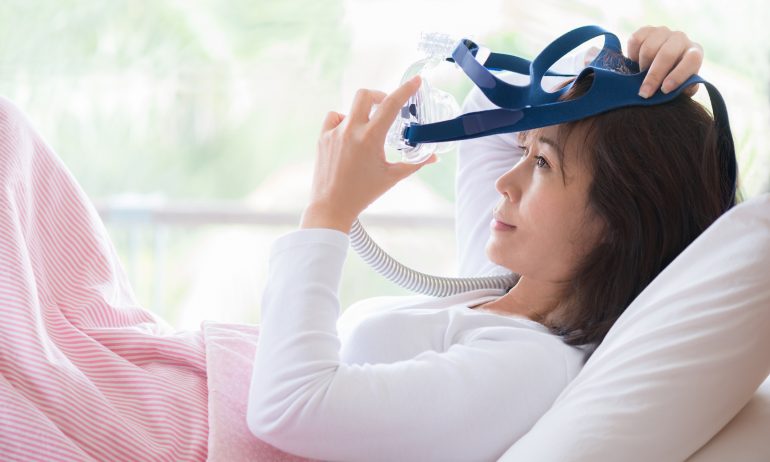Does Medicare Cover CPAP Machines and Supplies?

Many or all of the products featured here are from our partners who compensate us. This influences which products we write about and where and how the product appears on a page. However, this does not influence our evaluations. Our opinions are our own. Here is a list of our partners and here's how we make money.
Medicare pays most costs of CPAP, or continuous positive airway pressure therapy, a common treatment for people with obstructive sleep apnea. To get coverage, you’ll need a physician to prescribe a CPAP machine based on tests — including a sleep study that can be done either at home or in a lab setting — showing that you have obstructive sleep apnea, or OSA.
OSA is a serious condition that — in addition to disturbing your sleep — increases the risk of cardiovascular disease, diabetes and depression. A CPAP machine provides continuous positive airway pressure through a mask to keep your upper airway clear for easier breathing, better sleep and improved overall health.
Shopping for Medicare plans? We have you covered.
MEDICARE SUPPLEMENT, or Medigap, is private health insurance that covers “gaps” in traditional Medicare coverage. Compare options from our Medigap roundup. | |
Best for Medigap plan options | Best for premium discounts |
MEDICARE PART D covers outpatient prescription drugs for people on Medicare. Compare options from our Medicare Part D roundup. | |
Best for member satisfaction
| Best for low premiums
|
MEDICARE ADVANTAGE is an alternative to traditional Medicare offered by private health insurers. Compare options from our Medicare Advantage roundup. | |
Best for size of network
| Best for low-cost plans
|
Star ratings from CMS and on a 5-★ scale. | |
What’s required to get coverage for CPAP
Medicare Part B covers CPAP therapy in two stages. There’s a three-month trial period prescribed by your doctor to determine if CPAP works for you; this option doesn’t work for everyone. You'll need to give this therapy a good try and use the apparatus continuously for a specified period of time each night and during the trial months.
If the trial is successful, there’s a rental period of up to 13 months, after which you own the machine. To obtain coverage, you must rent the machine from a Medicare-approved supplier of durable medical equipment. And, importantly, you must continue to use the CPAP machine without interruption in order to get cost help from Medicare. Use of the machine is tracked using various technologies.
But even before you begin the trial, you must have a sleep test to determine that you meet the clinical criteria for obstructive sleep apnea. The good news is that if home sleep test equipment is available through a local physician’s office or sleep clinic, you need not spend the night in a sleep lab.
CPAP therapy comes with continuing expenses
CPAP therapy requires periodic purchase of replacement supplies, including masks, filters, headgear, the water reservoir in the humidifier and the tubing that connects the CPAP machine with your face mask. Medicare has an approved schedule for replacing supplies and covers them on varying schedules. Your CPAP supplier should be willing to help you optimize the timing of these purchases.
Not all supplies are covered under Medicare Part B. Make sure you have a clear understanding of the additional supplies you’ll need.
What you pay for CPAP
Because CPAP is covered as durable medical equipment, the Medicare Part B deductible applies; it’s $240 in 2024. Then you pay 20% of the Medicare-approved amount for the CPAP machine rental and ongoing supply purchases. If you have a Medigap plan, your 20% share should be picked up by your supplemental coverage.
If you have a Medicare Advantage plan, it may or may not cover the full costs of CPAP machines or supplies. Each plan can be different, so make sure you check your plan document or contact your plan provider to see what's covered.
An important note: Double-check that both your doctor and your CPAP supplier are enrolled in Medicare. If not, you may be charged a non-Medicare (usually higher) rate for your supplies and equipment and Medicare will not pay the 80% share.
Still deciding on the right carrier? Compare Medigap plans



